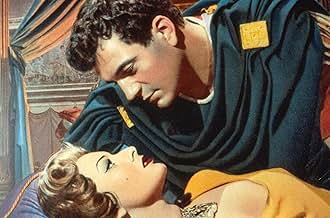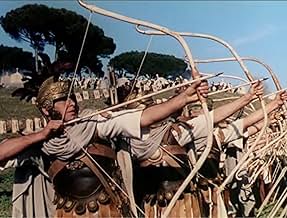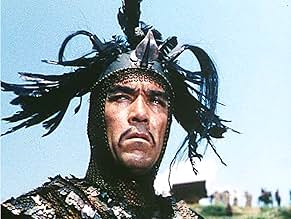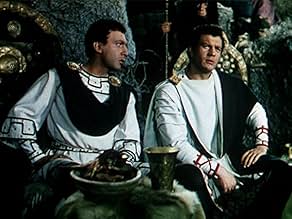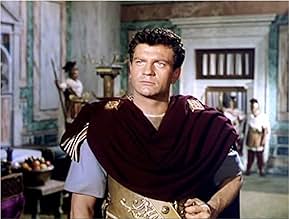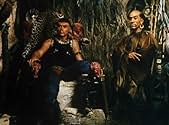अपनी भाषा में प्लॉट जोड़ेंAttila, the leader of the barbarian Huns and called by the Romans "The Scourge of God", sweeps onto the Italian peninsula, defeating all of the armies of Rome, until he and his men reach the... सभी पढ़ेंAttila, the leader of the barbarian Huns and called by the Romans "The Scourge of God", sweeps onto the Italian peninsula, defeating all of the armies of Rome, until he and his men reach the gates of the city itself.Attila, the leader of the barbarian Huns and called by the Romans "The Scourge of God", sweeps onto the Italian peninsula, defeating all of the armies of Rome, until he and his men reach the gates of the city itself.
Anthony Quinn
- Attila
- (as Anthony Qvinn)
Eduardo Ciannelli
- Onegesius - Counselor to Attila
- (as Eduardo Cianelli)
फ़ीचर्ड समीक्षाएं
Knowing of director Francisci’s subsequent contribution to the peplum genre, I fully expected this to be a low-rent version of SIGN OF THE PAGAN (1954) – which I watched the previous day – but the film ultimately proved fairly interesting in its own right. For one thing, the narrative has at least as many differences as similarities vis-a'-vis the Douglas Sirk epic and, once again, we have an imposing Hollywood star (Anthony Quinn) in the lead. Sophia Loren, then, stands in for Ludmilla Tcherina (though her character is ambitious and deceitful) while Henri Vidal – from the best Italian-made spectacular, FABIOLA (1948) – replaces Jeff Chandler (bafflingly, he dies here while Attila is allowed to live!). Another reversal has the Huns fighting amongst themselves – more specifically, Attila and his peace-craving brother: just as Jack Palance in SIGN OF THE PAGAN was forced to kill his daughter for what he deemed treacherous behavior, so does Quinn in this case with his sibling. In support of them, we have: Claude Laydu (from Robert Bresson’s DIARY OF A COUNTRY PRIEST [1951]), a most surprising choice to play the typically wimpish Emperor; Irene Papas, who takes on the role of Attila’s sole wife (and, conveniently, his astrologer as well); and Eduardo Ciannelli, appearing as a wise old Hun. While Sirk tried – with some measure of success – to put his distinctive mark upon the material, Francisci was content to imitate the Hollywood model (and QUO VADIS [1951] in particular). Consequently, the film features intermittent ponderous narration, gratuitous exotic touches (in the form of a dance sequence and Laydu keeping a pet leopard) and an unlikely – if still effective – spiritual conclusion wherein the Huns are finally driven away thanks to the intervention of Pope Leo and his ‘army’ of cross-wielding supporters. Otherwise, the picture has a handsome look (i.e. bearing soft colors), compelling enough confrontation scenes (within both camps), and a long-in-coming but satisfactory climactic skirmish. The main downside is that the version broadcast on late-night Italian TV is the shorter U.K. cut (running a mere 76 minutes in PAL mode), albeit in its native language, as opposed to the official 100-minute print (which probably explains the references to a couple of minor plot points that are not actually shown)! Incidentally, reading through the credits one recognizes the names of several crew members who would later become directors in their own right: Luciano Ercoli, Christian Marquand, Flavio Mogherini, Luigi Scattini and Primo Zeglio...not to mention some heavyweights in the international film industry like Dino De Laurentiis, Carlo Ponti, Giuseppe Rotunno, Karl Struss and Aldo Tonti!
An early sword-and-sandal epic from Italy casts Anthony Quinn as Attila the Hun, with dialog that sounds as though it came from a kung fu movie. "Attila" is probably most noticeable as an early appearance of Sophia Loren (she plays Honoria, who marries the vicious warrior). Otherwise, it's the sort of movie that belongs on "Mystery Science Theater 3000". At this point, I have serious doubts as to whether its even possible to make a good movie about a historical figure from that long ago. Maybe they just work best as spoofs in the vein of "Life of Brian".
Anyway, this is certainly the sort of flick that should be of interest to bad movie buffs. Not terrible, but that year, Anthony Quinn starred in one of Italy's greatest films: "La strada".
Anyway, this is certainly the sort of flick that should be of interest to bad movie buffs. Not terrible, but that year, Anthony Quinn starred in one of Italy's greatest films: "La strada".
Although not without its unintentionally funny moments, compared to most of the Sword and Sandal films that were churned out by Hollywood on the Tiber, this one is not at all bad.
Anthony Quinn's testosterone filled, Alpha male performance here certainly fits historian Edward Gibbon's description of Attila as 'a formidable barbarian' whilst the oestrogen of pneumatic Sophia Loren as Honoria practically leaps off the screen. Honoria was a tragic character who had the misfortune to be born the daughter of an emperor and to be treated miserably by her domineering mother but her one-dimensional portrayal here is par for the course in films of this type.
The year this film was released was notable for both Quinn and La Loren as he also appeared in a little opus entitled 'La Strada' and she was directed for the first time by Vittorio de Sica in the 'Pizza con credito' segment of 'L'Oro di Napoli' in which he brought out the Neapolitan earthiness and innate comedic ability that were to serve her so well through the years, not least in the amusing 'Peccato che sia una canaglia' from the same year which marked the first of her many films with a certain Marcello Mastroianni.
A good supporting cast, all of whom are adequately 'dubbed' comprises Colette Régis as the wilful Galla Placidia and Henri Vidal as Aetius. The emperor Valentinian III, described by Gibbon as 'feeble and dissolute', is convincingly played by Claude Laydu who will forever be associated with the title character of Bresson's 'Journal d'un curé de compagne'. Mention must be made of the wondrous Irene Papas in the minor role of one of Attila's many wives. She was to go from strength to strength, especially in classical Greek tragedy and utilised what one critic has called her 'elemental nobility' as the widow opposite Quinn's Zorba. For those interested in such things, neither Honoria nor Aetius met their ends in the manner depicted here.
Designed to warm the hearts of the Faithful, the final scene, complete with heavenly chorus and a crucifix in the sky, shows Attila being persuaded by Pope Leo not to attack Rome. It is not known what was said or indeed what inducements were offered but it is doubtful whether a heathen such as Attila would have been swayed by Leo's eloquence and sacerdotal robes alone and it is more likely that he turned back because of plague in his army, lack of food and the threat of Roman reinforcements from the East.
Oh well, as the man said, 'it's only a movie.'
Anthony Quinn's testosterone filled, Alpha male performance here certainly fits historian Edward Gibbon's description of Attila as 'a formidable barbarian' whilst the oestrogen of pneumatic Sophia Loren as Honoria practically leaps off the screen. Honoria was a tragic character who had the misfortune to be born the daughter of an emperor and to be treated miserably by her domineering mother but her one-dimensional portrayal here is par for the course in films of this type.
The year this film was released was notable for both Quinn and La Loren as he also appeared in a little opus entitled 'La Strada' and she was directed for the first time by Vittorio de Sica in the 'Pizza con credito' segment of 'L'Oro di Napoli' in which he brought out the Neapolitan earthiness and innate comedic ability that were to serve her so well through the years, not least in the amusing 'Peccato che sia una canaglia' from the same year which marked the first of her many films with a certain Marcello Mastroianni.
A good supporting cast, all of whom are adequately 'dubbed' comprises Colette Régis as the wilful Galla Placidia and Henri Vidal as Aetius. The emperor Valentinian III, described by Gibbon as 'feeble and dissolute', is convincingly played by Claude Laydu who will forever be associated with the title character of Bresson's 'Journal d'un curé de compagne'. Mention must be made of the wondrous Irene Papas in the minor role of one of Attila's many wives. She was to go from strength to strength, especially in classical Greek tragedy and utilised what one critic has called her 'elemental nobility' as the widow opposite Quinn's Zorba. For those interested in such things, neither Honoria nor Aetius met their ends in the manner depicted here.
Designed to warm the hearts of the Faithful, the final scene, complete with heavenly chorus and a crucifix in the sky, shows Attila being persuaded by Pope Leo not to attack Rome. It is not known what was said or indeed what inducements were offered but it is doubtful whether a heathen such as Attila would have been swayed by Leo's eloquence and sacerdotal robes alone and it is more likely that he turned back because of plague in his army, lack of food and the threat of Roman reinforcements from the East.
Oh well, as the man said, 'it's only a movie.'
It's very hard to make a film about Attila and his times because if you want to make it historically accurate, well, that's not a simple thing. There are many Church traditions about Attila and his eventual sparing of Rome but historians of the day were notorious for shaping it to make themselves or their leaders look best. It is what it is...or was. So, it's difficult to say exactly what Attila did....such as the death of his brother...of which are contradictory accounts. This version of his latter days is based mostly on Church traditions.
Like many films of the 1950s and 60s, European filmmakers hired a famous American actor to star in the production. In this case, Anthony Quinn plays Attila the Hun...and he also appeared in a few other European films, such as Fellini's "La Strada". And, Quinn was then dubbed into Italian...as most of the actors in the film are Italians (though it's a French-Italian co-production).
The story is set from the period in which Attila agreed to a substantial bribe by the Romans not to destroy the Empire. Shortly after this, Attila reneged on the agreement and a long strong of bloody battles resulted. This film dramatizes this period and offers a traditional view as to why he spared Rome.
The film is well made and entertaining....it just isn't perfect history because of all the speculation. But this is NOT a reason to skip the film. It's well worth your time and it's also nice to see Sophia Loren in a supporting role early in her film career.
By the way, although the acting was generally good, the character Emperor Valentinian III seemed a bit overacted. Perhaps I'm wrong...he just didn't seem all that realistic.
Like many films of the 1950s and 60s, European filmmakers hired a famous American actor to star in the production. In this case, Anthony Quinn plays Attila the Hun...and he also appeared in a few other European films, such as Fellini's "La Strada". And, Quinn was then dubbed into Italian...as most of the actors in the film are Italians (though it's a French-Italian co-production).
The story is set from the period in which Attila agreed to a substantial bribe by the Romans not to destroy the Empire. Shortly after this, Attila reneged on the agreement and a long strong of bloody battles resulted. This film dramatizes this period and offers a traditional view as to why he spared Rome.
The film is well made and entertaining....it just isn't perfect history because of all the speculation. But this is NOT a reason to skip the film. It's well worth your time and it's also nice to see Sophia Loren in a supporting role early in her film career.
By the way, although the acting was generally good, the character Emperor Valentinian III seemed a bit overacted. Perhaps I'm wrong...he just didn't seem all that realistic.
This is a spectacular Italian film , though full of historic inaccuracy and being well starred by Anthony Quinn as Attila . This ¨Attila¨(1953) by Pietro Francisci boasts itself a good cast with Anthony Quinn , Sofia Loren , Irena Papas , Ettore Manni and Henry Vidal as general Aecio . Epic and historical portrayal about Attila , including court intrigue , romance , treason , impressive battles and it is set during the waning days of Roman Empire , as the barbarian Huns are making their way toward Europe . As a valiant warrior named Attila (Anthony Quinn) violently assumes Hun leadership confronting his brother Bleda (Ettore Manni) . But this is not enough for him , Attila seeks to create an empire and he will stop at nothing to accomplish it . Attila , the leader of the barbarian Huns combats enemies and , finally , the Roman Empire until he and his violent warriors reach the gates of the city itself . He's the Barbarian Attila , king of the Huns , whose hordes from various tribes and allies have been sweeping the Asian steppes and both Roman empires . But an egoistic princess called Honoria (Sofia Loren) now offers her hand and the empire as dowry to Attila , just what Bleda hoped for . While scared , nutty Roman emperor Valentinian (Claude Laytu) can only mourn his pet cheetah and Roman general Aethius is appointed by Galla Placidia (Collete Régis) to lead a desperate defense , who fear nothing , except perhaps the mysterious Christian god along with his earthly representative , Pope Leo I . Men followed . Women worshiped . Rome trembled . Surging Spectacle and Savagery Overwhelms the Screen With Passion and Violence! Cast of Thundering Thousands! See the Hun Hordes Storm Out of Asia to Crash Head-On Into the Vaunted Roman Legions! Against the ravaging hordes of Attila stood a warrior's might and a people's faith! . Against his ruthless pagan lusts , the power of a woman's love!
Attila's feats in the Western and Eastern Roman Empires with some historical incorrectness . It deals with Attile from his confrontation with his more popular brother Bleda who was murdered during a hunt party , and subsequently persuading the Barbarian hordes to march with him on the empire until his death . It results to be an epic adventure yarn set in 5th-Century about the chieftain Attila the Hun who joins the warring clans under his banner , as he was a leader of the Hunnic Empire , a tribal confederation consisting of Huns , Ostrogoths , and Alans , among others , on the territory of Central and Eastern Europe , while Roman Empire is bristling under the leadership of cunning General Aetius and of the incompetent Caesar Valentinian . This thrilling movie contains action , overwhelming battles , emotion , fights , hokey historical events and the crowed scenes of the Huns are impressively made . Big production design , lavishly produced , brilliant photography and rousing soundtrack as you'd expect from a big-budgeted movie at the time , being financed by two greatest Italian producers : Carlo Ponti and Dino de Laurentiis . There takes place a fictitious battle of wits between Attila/Anthony Quinn and Aethius/Henry Vidal . Anthony Quinn dominates with his bravery this historical adventure , while Valentinian rules badly the empire , being grumpily performed by overacting Claude Laydu in Neron/Peter Ustinov style . Henry Vidal plays appropriately the Roman general Aethius who knows the Huns well as a result of former hostage exchanges , fails to get a true peace but buys a shaky one promising doubled tribute . Here stands out Anthony Quinn who gives a nice acting , as usual ; Quinn work is well up to his ordinary high standards . Anthony played a lot of exotic roles , such as : Osceola in Seminola , Crazy Horse in They died with boots on , Chief Yellow Hand in Buffalo Bill , Kublai Khan in Marco Polo , a bullfighter in Santos the magnificent , an Emir in Simbad the sailor , a Mexican rebel in Viva Zapata , Quasimodo in The hunchback of Paris , a Basque in The passage and Zorba the Greek , among others . But the beauty and attractive Sophia Loren is the real star of this film . Great support cast provide some solid secondary interpretations , such as : Claude Laydu as Valentinianus , Irene Papas , Colette Régis as Galla Placidia , Ettore Manni as Bleda , brother of Attila , Eduardo Ciannelli and Christian Marquand . Brilliant and glimmering cinematography in Technicolor by Aldo Tonti . Evocative as well as moving musical score by Raoul Kraushaar and Enzo Masetti . The motion picture was professionally directed by a Peplum expert , Pietro Francisci , though it has some flaws and historical mistakes .
The picture is based on historical events about Attila called by the Romans "The Scourge of God", as he sweeps onto the Italian peninsula , defeating all of the armies of Rome , and other essential roles appearing as the valiant general Aecio or Aethius , the clueless emperor Valentiniano , Gala Placidia who married King Goth Ataulpho and her daughter Honoria . When a powerful King Hun dies , he leaves the throne to two sons : Bleda , who tired of war and hungry , bloody campaigns , wants to settle as allies of Rome in peace and his brother Attila who believes only in the power of the sword . Then , Attila kills his brother and he rules over the Barbarian Huns . While , the court of weakling emperor Valentinianus , moved north from Rome to Ravenna , where the true ruler is empress-mother Galla Placidia , widow of a barbarian king , who refuses the terms imposed by Attila and imprisons Aethius , who still refuses to seize power with Valentinian's sister Honoria . Aethius is pardoned and is appointed commander-in-chief of the Roman troops . During his reign , Attila was one of the most feared enemies of the Western and Eastern Roman Empires . In an attempt to quell a Hun invasion , ambitious Roman General Flavius Aetius attempts to form an alliance with the eastern Roman emperor Teodosius and Visigoth King Theodoric scheming against their mutual enemy . By the way Attila crossed the Danube twice and plundered the Balkans, but was unable to take Constantinople . His unsuccessful campaign in Persia was followed in 441 by an invasion of the Eastern Roman (Byzantine) Empire , the success of which emboldened Attila to invade the West . He also attempted to conquer Roman Gaul (modern France) , crossing the Rhine in 451 and marching as far as Orleans before being defeated at the Battle of the Catalaunian Plains . He subsequently invaded Italy , devastating the northern provinces , but was unable to take Rome . As Attila marches across Empire to Rome and things look bleak for the weakened imperial forces . As the neglected legions without serious fortifications are no match for the Hun hordes . While Attile attempts to march against Rome but this plan backfires , and it soon becomes clear that a violent confrontation between all three armies awaits . Emperor Valentinian III sent three envoys , the high civilian officers Gennadius Avienus and Trigetius , as well as the Bishop of Rome Leo I , who met Attila at Mincio in the vicinity of Mantua and as the conqueror had an awe of the power of the Christians' God , he obtained from him the promise that he would withdraw from Italy and negotiate peace with the Emperor . Finally , Aecio vanquished Attile in Chalons . He planned for further campaigns against the Romans but died in 453 . After Attila's death his close adviser Ardaric of the Gepids led a Germanic revolt against Hunnic rule, after which the Hunnic Empire quickly collapsed .
Other films dealing with this historical character are the following ones : ¨Sign of the pagan¨(1954) by Douglas Sirk with Jack Palance as Attila , Jeff Chandler , Ludmilla Tchérina , Moroni Olsen . ¨The Nibelungos , vengeance of Siegfried¨ (1967) by Harald Reinl with Herbert Lom as Attila . And mini-series ¨Attila¨ (2001) with Gerard Butler as Attila , Powers Boothe , Simmone Mackinnon , Jonathan Hyde , Steven Berkoff , Tommy Flanagan and and Red Rogers as Valentiniano .
Attila's feats in the Western and Eastern Roman Empires with some historical incorrectness . It deals with Attile from his confrontation with his more popular brother Bleda who was murdered during a hunt party , and subsequently persuading the Barbarian hordes to march with him on the empire until his death . It results to be an epic adventure yarn set in 5th-Century about the chieftain Attila the Hun who joins the warring clans under his banner , as he was a leader of the Hunnic Empire , a tribal confederation consisting of Huns , Ostrogoths , and Alans , among others , on the territory of Central and Eastern Europe , while Roman Empire is bristling under the leadership of cunning General Aetius and of the incompetent Caesar Valentinian . This thrilling movie contains action , overwhelming battles , emotion , fights , hokey historical events and the crowed scenes of the Huns are impressively made . Big production design , lavishly produced , brilliant photography and rousing soundtrack as you'd expect from a big-budgeted movie at the time , being financed by two greatest Italian producers : Carlo Ponti and Dino de Laurentiis . There takes place a fictitious battle of wits between Attila/Anthony Quinn and Aethius/Henry Vidal . Anthony Quinn dominates with his bravery this historical adventure , while Valentinian rules badly the empire , being grumpily performed by overacting Claude Laydu in Neron/Peter Ustinov style . Henry Vidal plays appropriately the Roman general Aethius who knows the Huns well as a result of former hostage exchanges , fails to get a true peace but buys a shaky one promising doubled tribute . Here stands out Anthony Quinn who gives a nice acting , as usual ; Quinn work is well up to his ordinary high standards . Anthony played a lot of exotic roles , such as : Osceola in Seminola , Crazy Horse in They died with boots on , Chief Yellow Hand in Buffalo Bill , Kublai Khan in Marco Polo , a bullfighter in Santos the magnificent , an Emir in Simbad the sailor , a Mexican rebel in Viva Zapata , Quasimodo in The hunchback of Paris , a Basque in The passage and Zorba the Greek , among others . But the beauty and attractive Sophia Loren is the real star of this film . Great support cast provide some solid secondary interpretations , such as : Claude Laydu as Valentinianus , Irene Papas , Colette Régis as Galla Placidia , Ettore Manni as Bleda , brother of Attila , Eduardo Ciannelli and Christian Marquand . Brilliant and glimmering cinematography in Technicolor by Aldo Tonti . Evocative as well as moving musical score by Raoul Kraushaar and Enzo Masetti . The motion picture was professionally directed by a Peplum expert , Pietro Francisci , though it has some flaws and historical mistakes .
The picture is based on historical events about Attila called by the Romans "The Scourge of God", as he sweeps onto the Italian peninsula , defeating all of the armies of Rome , and other essential roles appearing as the valiant general Aecio or Aethius , the clueless emperor Valentiniano , Gala Placidia who married King Goth Ataulpho and her daughter Honoria . When a powerful King Hun dies , he leaves the throne to two sons : Bleda , who tired of war and hungry , bloody campaigns , wants to settle as allies of Rome in peace and his brother Attila who believes only in the power of the sword . Then , Attila kills his brother and he rules over the Barbarian Huns . While , the court of weakling emperor Valentinianus , moved north from Rome to Ravenna , where the true ruler is empress-mother Galla Placidia , widow of a barbarian king , who refuses the terms imposed by Attila and imprisons Aethius , who still refuses to seize power with Valentinian's sister Honoria . Aethius is pardoned and is appointed commander-in-chief of the Roman troops . During his reign , Attila was one of the most feared enemies of the Western and Eastern Roman Empires . In an attempt to quell a Hun invasion , ambitious Roman General Flavius Aetius attempts to form an alliance with the eastern Roman emperor Teodosius and Visigoth King Theodoric scheming against their mutual enemy . By the way Attila crossed the Danube twice and plundered the Balkans, but was unable to take Constantinople . His unsuccessful campaign in Persia was followed in 441 by an invasion of the Eastern Roman (Byzantine) Empire , the success of which emboldened Attila to invade the West . He also attempted to conquer Roman Gaul (modern France) , crossing the Rhine in 451 and marching as far as Orleans before being defeated at the Battle of the Catalaunian Plains . He subsequently invaded Italy , devastating the northern provinces , but was unable to take Rome . As Attila marches across Empire to Rome and things look bleak for the weakened imperial forces . As the neglected legions without serious fortifications are no match for the Hun hordes . While Attile attempts to march against Rome but this plan backfires , and it soon becomes clear that a violent confrontation between all three armies awaits . Emperor Valentinian III sent three envoys , the high civilian officers Gennadius Avienus and Trigetius , as well as the Bishop of Rome Leo I , who met Attila at Mincio in the vicinity of Mantua and as the conqueror had an awe of the power of the Christians' God , he obtained from him the promise that he would withdraw from Italy and negotiate peace with the Emperor . Finally , Aecio vanquished Attile in Chalons . He planned for further campaigns against the Romans but died in 453 . After Attila's death his close adviser Ardaric of the Gepids led a Germanic revolt against Hunnic rule, after which the Hunnic Empire quickly collapsed .
Other films dealing with this historical character are the following ones : ¨Sign of the pagan¨(1954) by Douglas Sirk with Jack Palance as Attila , Jeff Chandler , Ludmilla Tchérina , Moroni Olsen . ¨The Nibelungos , vengeance of Siegfried¨ (1967) by Harald Reinl with Herbert Lom as Attila . And mini-series ¨Attila¨ (2001) with Gerard Butler as Attila , Powers Boothe , Simmone Mackinnon , Jonathan Hyde , Steven Berkoff , Tommy Flanagan and and Red Rogers as Valentiniano .
क्या आपको पता है
- ट्रिवियाAnthony Quinn worked on La strada (1954) simultaneously with this movie. He remarked that it had a much smaller budget than the Attila epic, but considered it a much better film.
- क्रेज़ी क्रेडिटAlthough this was an Italian co-production shot in Italy, Eduardo Ciannelli's name is misspelled in the credit.
- कनेक्शनFeatured in Soldiers: Cavalry (1985)
टॉप पसंद
रेटिंग देने के लिए साइन-इन करें और वैयक्तिकृत सुझावों के लिए वॉचलिस्ट करें
- How long is Attila?Alexa द्वारा संचालित
विवरण
बॉक्स ऑफ़िस
- बजट
- ITL 45,00,00,000(अनुमानित)
- चलने की अवधि1 घंटा 20 मिनट
- पक्ष अनुपात
- 1.37 : 1
इस पेज में योगदान दें
किसी बदलाव का सुझाव दें या अनुपलब्ध कॉन्टेंट जोड़ें


